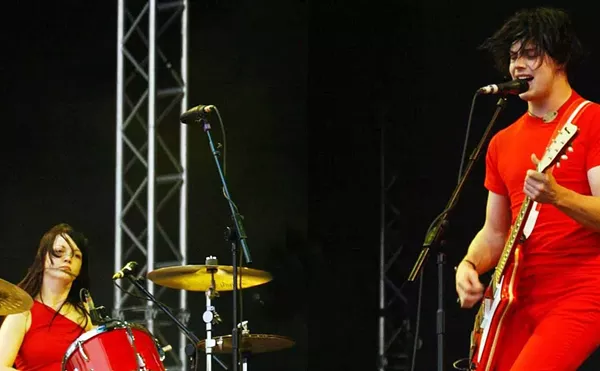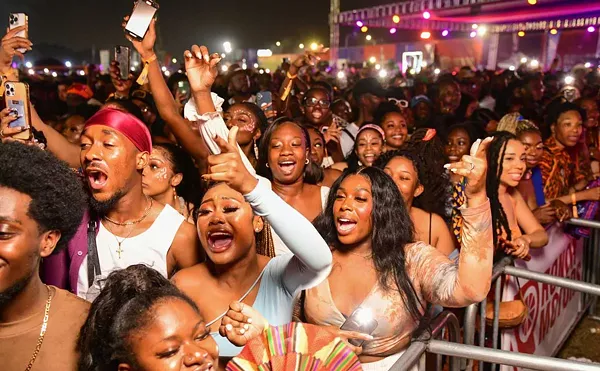
Audio By Carbonatix
[
{
"name": "GPT - Leaderboard - Inline - Content",
"component": "35519556",
"insertPoint": "5th",
"startingPoint": "3",
"requiredCountToDisplay": "3",
"maxInsertions": 100,
"adList": [
{
"adPreset": "LeaderboardInline"
}
]
}
]
There’s a poet in the picture. He’s got a cop standing on either side, each looking grim, not looking at the poet but staring out at his audience. For that matter, the poet looks rather grim himself, his megaphone aimed at the crowd filling the picture’s foreground.
The other day, the same poet was on the telephone from a Ramada Inn in San Francisco where he’d take a club stage a few hours later. He filled in the details: The picture was taken on the steps of a police station in the north of England: “It was a demonstration about the arrest of a guy named George Lindo who had been framed in a robbery charge and there was a campaign to establish his innocence and get him out of prison. And I was reciting a poem on the steps.”
Asked what he thinks when he sees the picture of himself, Linton Kwesi Johnson quips: “How young and handsome I was.”
When the picture was snapped roughly a quarter century ago, Johnson was pioneering a new sensibility on the written page as well as on record. Jamaican-born and raised in London from the age of 11, he was giving a voice to a generation of Afro-Caribbean immigrants; in dialect poems such as “Inglan Is A Bitch” he described their experiences, articulated their politics, turned their protests into anthems. In setting those poems to reggae along with the producer-musician Dennis Bovell, he was inventing a new form that he dubbed “dub poetry.”
And given the tensions of those times, he never quite expected to see these times. It wasn’t an imminent fear that, for instance, those bobbies on the station step would suddenly “smash ’im brains in,” to paraphrase one of his pieces. “It was just the fact that I was an activist and so many people were being brutalized and killed in police cells … and assassinated,” he says. “I was involved in radical and revolutionary politics as a youngster, and you felt you could die.”
He lived to become a radical success story. He caught on first with the young black Britons and with punks; reggae and punk shared a “more or less anti-establishment” music ethos, as he puts it.
He recorded a string of thoughtful, probing and musically sui generis records for Virgin and then Island Records. “Calm but deadly serious intonations riding with almost deadpan monotone over jazz-flecked arrangements,” goes one critic’s description. But when Island offered a full-tilt, big-promotion, star-maker contract, Johnson balked and bolted. “No regrets, none whatsoever,” Johnson says of his decision to start his own LKJ Records in 1986. “I’ve always been independent minded. I believe in artistic freedom and LKJ Records, my own little label, has given me the measure of independence. I set my own agenda. I do what I want, the way I want to do it.”
Currently that means touring in the States with Bovell and their band for the sixth or so time, and making a Detroit debut. It means delivering selections from the full span of his career, reflecting how that upstart voice of black Britain came to encompass an internationalist perspective (he’s hailed Poland’s Solidarity movement and in “Mi Revalueshanary Fren” tied the crumbling of the Soviet bloc to the fall of apartheid) and personal concerns. The title track of his last release, 1998’s More Time, mounts the soapbox for a shorter work week.
The technology that bolsters productivity and profits can — given the political will — work for workers, he says: “There is no immutable law of nature that says we have to work 40 hours a week from 16 to 65.”
Ironically, it’s time that’s short for Johnson when he’s touring with that message. And having turned 50 a couple weeks ago, he’s aware of his time being short: “Half of your life have gone and you’re on the last few furlong and you become more aware of your own mortality.”
Plans? He talks about a new collection of dub remixes and the like. But the bottom line, he says, is to enjoy himself “and keep on doing what I’ve been doing.”
And before he hangs up, he has one more thing to get across: “The only thing that I always say is that the struggle for equality and social justice is an ongoing one: La luta continua.”
Linton Kwesi Johnson appears at the Detroit Festival of the Arts Friday at 8:30 p.m. at the Charter One/Metro Times Stage on Kirby east of John R. Other acts this weekend include the Andy Bey Quartet, Simon Shaheen and Qantara, and Dr. Al Kooper and the Funky Faculty. See the complete schedule at detroitfestival.com. Johnson’s Web site is www.lkjrecords.com
W. Kim Heron is the Metro Times managing editor. Send comments to wkheron@metrotimes.com.




